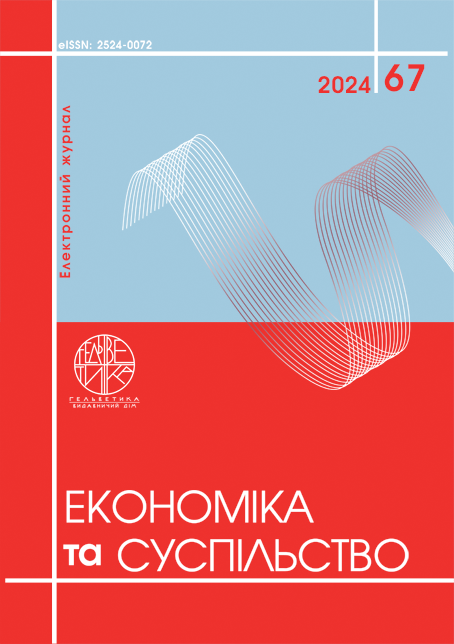ЗАБЕЗПЕЧЕННЯ СОЦІАЛЬНОЇ ВІДПОВІДАЛЬНОСТІ ІНДУСТРІЇ ГОСТИННОСТІ КРІЗЬ ПРИЗМУ ІМПАКТ-ІНВЕСТУВАННЯ
Анотація
Стаття присвячена дослідженню особливостей забезпечення соціальної відповідальності індустрії гостинності крізь призму імпакт-інвестування. Результати дослідження окреслюють ключову роль політики імпакт-інвестування у сприянні регіональному економічному розвитку та покращенню стану довкілля. За результатами дослідження також визначено, що політика імпакт-інвестування відіграє вирішальну роль для держав з точки зору регіонального економічного розвитку та покращення стану довкілля і сприяє досягненню цілей сталого економічного розвитку та вирішенню глобальної екологічної ситуації. Важливо визнати обмеженість результатів цього дослідження, оскільки отримані висновки не можуть бути універсальними, зважаючи на те, що вплив інвестицій може суттєво відрізнятися залежно від регіональних та галузевих відмінностей в індустрії гостинності. Тому майбутні дослідження повинні бути зосереджені на конкретних регіонах чи країнах, щоб виявити регіональні відмінності та нюанси у впливі імпакт-інвестицій.
Посилання
Ban Q. (2023). The Quality of Corporate Social Responsibility Information Disclosure and Enterprise Innovation: Evidence from Chinese Listed Companies. Sustainability. 15(1):238.
Barman, E. (2015). Of principle and principal: Value plurality in the market of impact investing. Journal of Valuation Studies, 3(1), 9–44. DOI: https://doi.org/10.3384/VS.2001-5592.15319
Bonnici, F., & Raja, P. (2020). 6 ways social innovators are responding to the COVID-19 pandemic by Commissioner. World Economic Forum, 1–12.
Brandstetter, L., & Lehner, O.M. (2015). Opening the market for impact investments: The need for adapted portfolio tools. Entrepreneurship Research Journal, 5(2), 87–07. DOI: https://doi.org/10.1515/erj-2015-0003
Chang, D.-S.; Wu, W.-D. (2021). Impact of the COVID-19 Pandemic on the Tourism Industry: Applying TRIZ and DEMATEL to Construct a Decision-Making Model. Sustainability, 13, 7610. DOI: https://doi.org/10.3390/su13147610
Clarkin, J.E., & Cangioni, C.L. (2016). Impact investing: A primer and review of the literature. Journal of Entrepreneurship Research, 6(2), 135–173. DOI: https://doi.org/10.1515/erj-2014-0011
Henseler, M., Maisonnave, H., Maskaeva, A. (2022). Economic impacts of COVID-19 on the tourism sector in Tanzania, Annals of Tourism Research Empirical Insights, Volume 3, Issue 1. DOI: https://doi.org/10.1016/j.annale.2022.100042
Höchstädter, A.K., & Scheck, B. (2015). What’s in a name: An analysis of impact investing understandings by academics and practitioners. Journal of Business Ethics, 132(2), 449–475. DOI: https://doi.org/10.1007/s10551-014-2327-0
Johnson, V. L., Kiser, A., Washington, R., & Torres, R. (2018). Limitations to the rapid adoption of M-payment services: Understanding the impact of privacy risk on M-Payment services. Computers in Human Behavior, 79, 111–122. DOI: https://doi.org/10.1016/j.chb.2017.10.035
Lyon, F., & Owen, R. (2019). Financing social enterprises and the demand for social investment. Strategic Change, 28(1), 47–57. DOI: https://doi.org/10.1002/jsc.2245
Mogapi, E.M., Sutherland, M.M., & Wilson Prangley, A. (2019). Impact investing in South Africa: Managing tensions between financial returns and social impact. European Business Review, 31(3), 397–419. DOI: https://doi.org/10.1108/EBR-11-2017-0212
Mudaliar, A., Bass, R., Dietrich, H., & Nova, N. (2019). Annual impact investor survey. Global Impact Investing Network.
Ormiston, J., Charlton, K., Donald, M.S., & Seymour, R.G. (2015). Overcoming the challenges of impact investing: Insights from leading investors. Journal of Social Entrepreneurship, 6(3), 1–27. DOI: https://doi.org/10.1080/19420676.2015.1049285
Phillips, S. D., & Johnson, B. (2019). Inching to Impact: The Demand Side of Social Impact Investing. Journal of Business Ethics, 0123456789. DOI: https://doi.org/10.1007/s10551-019-04241-5
Piga, C.A., Abrate, G., Viglia, G. et al. (2022). How the hospitality industry reacts to COVID-19: structural, managerial and tactical factors. J Revenue Pricing Manag., 21, 503–516. DOI: https://doi.org/10.1057/s41272-021-00359-2
Revelli, C. (2017). Socially responsible investing (SRI): From mainstream to the margin? Research in International Business and Finance, 39(B), 711–717. DOI: https://doi.org/10.1016/j.ribaf.2015.11.003
Roundy, P. T. (2019). Regional differences in impact investment: a theory of impact investing ecosystems. Social Responsibility Journal, 16(4), 467–485. DOI: https://doi.org/10.1108/SRJ-11-2018-0302
Sales, T. (2015). Impact investment in Africa: Trends, constraints, and opportunities. United Nations Development Programme.
Urban, B., & George, J. (2018). An empirical study on measures relating to impact investing in South Africa. International Journal of Sustainable Economy, 10(1), 61–77. DOI: https://doi.org/10.1504/IJSE.2018.088622
Widyawati, L. (2020). A systematic literature review of socially responsible investment and environmental social governance metrics. Business Strategy and the Environment, 29(2), 619–637. DOI: https://doi.org/10.1002/bse.2393
Wood, D., Thornley, B., & Grace, K. (2013). Institutional impact investing: Practice and policy. Journal of Sustainable Finance and Investment, 3(2), 75–94. DOI: https://doi.org/10.1080/20430795.2013.776256
Yasar, B. (2021). The New Investment Landscape: Equity Crowdfunding. Central Bank Review. DOI: https://doi.org/10.1016/j.cbrev.2021.01.001
Yılmaz, I. S., & Yaşar, B. (2021). Crowdfunding as a Financial Tool for Social Enterprises. In Creating Social Value Through Social Entrepreneurship (pp. 135–157). IGI Global. DOI: https://doi.org/10.4018/978-1-7998-4727-4.ch008

Ця робота ліцензується відповідно до Creative Commons Attribution 4.0 International License.


